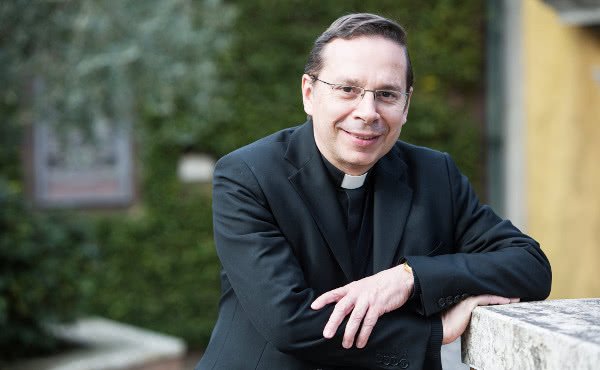Monsignor Mariano Fazio (Buenos Aires, 1960) has just published El último romántico. San Josemaria en el siglo XXI [The Last Romantic. Saint Josemaria in the 21st Century]. His book is not a biography of the founder of Opus Dei, nor a theological study or a compilation of quotes. “It is simply an attempt,” the author explains, “to present in an orderly manner some of the consequences of the light received by Saint Josemaria ninety years ago, and which today are especially relevant.”
You met Saint Josemaria in Argentina. What do you remember about that encounter?
I remember a priest with a big smile, who transmitted with naturalness a great joy. His words were positive and encouraging, filled with understanding and also with friendly demands. The smile on his face is still engraved on my memory, and has been an incentive for me to try to smile, also when apparently there are no reasons to do so.
I was just fourteen years old and knew very little about Opus Dei. There were many high school and university students there, all in search of great ideals. I have to admit that I remember very few specific things that Saint Josemaría told us, but one sentence really struck me: “Buenos Aires has to be the city of joyful souls.” I returned home with the horizons in my life considerably broadened.
“The last romantic.” Why do you describe Saint Josemaria like this?
He saw himself in line with the nineteenth-century romantics who fought for personal freedom. “I love the freedom of others,” he said, “yours, that of the person passing by right now on the street, because if I didn’t love it, I couldn’t defend mine. But that’s not the main reason. The main reason is this: that Christ died on the Cross to give us freedom, so that we could live in libertatem gloriae filiorum Dei” (in the freedom and glory of the children of God).
Without freedom we can’t love. Therefore he thought that in the natural order God’s greatest gift to mankind was having created us as free beings. God wanted to run the “risk” of our freedom, so that we could freely respond with our love to his infinite love. Saint Josemaria lamented that, in recent times, many people were demanding freedom in order to make use of it to destroy others, to subject them and step on them. In contrast, he defended a “Christian romanticism”: loving the freedom of others, with affection.
Next October 2 will mark 90 years since the founding of Opus Dei. What message does your founder have for the 21st century?
90 years ago Saint Josemaria received a light from God that gave a new meaning to his life, where love (with its ingredient of divine excess) and freedom hold a central place. The hearts of men and women of all times and places hunger for love and freedom. We are made to love and be loved. That’s why it is so easy to feel drawn to his spirit. His message has changed the lives of many people throughout these decades, and is destined to expand. Anniversaries, in themselves, are simply dates, but to me personally it has served as an occasion to reflect on some aspects of his message that are especially illuminating in the context of contemporary culture.
Dostoievsky, Perez Galdós, Tolkien, Chesterton... your book contains many references to classical and modern authors.
Classical authors have a special ability to illuminate some of the key issues that affect all of us. With his concern for human freedom, Saint Josemaria has also dealt with many of these ideas and therefore I have tried to make some inter-connections that are relevant for the 21st century and future centuries. For example, Gogol and Tolkien were thankful that God had granted human beings a share in his creative power; Kafka and Kierkegaard have a lot to say about the relationship of each person with their father; Chesterton offers reflections on loving God in the world; Machado provokes us to think about true love... As I try to show in the book, work, love, filiation and the world are some of the themes on which Saint Josemaria offers quite valuable suggestions, ideas that we also find in the classics.
In the introduction, Monsignor Ocáriz talks about the rejuvenating power of Christianity...
The Prelate of Opus Dei compares the current exhaustion of ideas and values with that which, twenty centuries ago, affected the society in which Christianity took root. The life of Jesus’ disciples very soon began to rejuvenate the life of an aging society: renewing it with the youth and newness of God. Saint Josemaria’s proposals come from the Gospel, which is why they are so necessary for the 21st century: the joy of being children of God, work as a place to seek holiness, the positive character of secularity, the importance of family life and love, the value of pluralism, the social repercussions of the life of each and every Christian.
